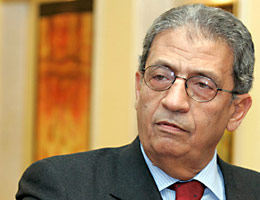2ND ROUNDUP: Divisions mar Arab League summit
 Doha - Leaders at an Arab League summit in Qatar on Monday were unanimous in their appeals for Arab unity - but that message was almost lost amid high-profile disputes between member states and the sensational appearance of Sudanese President Omar al-Bashir despite an international warrant for his arrest.
Doha - Leaders at an Arab League summit in Qatar on Monday were unanimous in their appeals for Arab unity - but that message was almost lost amid high-profile disputes between member states and the sensational appearance of Sudanese President Omar al-Bashir despite an international warrant for his arrest.
Arab League Secretary-General Amr Mussa, delivering the summit's conclusions, affirmed the 22-member body's support for al-Bashir in his confrontation with the International Criminal Court (ICC) and the UN Security Council.
The Arab League further vowed to pursue attempts to bring Israeli leaders to justice for alleged war crimes committed during Israel's 22-day offensive in the Gaza Strip that started on December 27, to continue efforts to make the Middle East a "nuclear-weapons-free zone" and to hold Israel to a timeline in future peace negotiations.
"We will not wait forever," Qatari Emir Sheikh Hamad bin Khalifa al-Thani told reporters.
Sudan confirmed al-Bashir's attendance at Monday's summit only hours after the ICC issued a warrant for his arrest on charges of crimes against humanity on March 4.
"The presence of President Bashir at this conference should be used as an opportunity to bring forth the international opprobrium to what is happening in Darfur and in south Sudan," said US State Department spokesman Gordon Duguid in Washington on Monday.
Al-Bashir was characteristically defiant, rejecting UN Secretary General Ban Ki-moon's calls at the summit to rescind Sudan's expulsion of 13 international aid organizations on the grounds that "relief efforts should not be politicized."
He accused Israel of arming rebels in Darfur, and the US of "threatening international peace and stability" through its control of the UN Security Council. He railed against "double standards" in the administration of international justice.
"There should be one standard of justice, not one standard of justice for the weak and one for the strong," al-Bashir said. "Double standards can create terrorism."
In the end, the summit was marked as much by who did not attend as by who did. Despite reports that Qatar might invite Iranian President Mahmoud Ahmadinejad or delegates from Hamas to address the summit, neither showed up, and precious little was explicitly said about either.
Iraqi Prime Minister Nuri al-Maliki obliquely referred to the conflicting alliances between Syria and Iran on the one hand, and Saudi Arabia and Egypt on the other. These alliances, he said, "harm Iraq."
And, in an oblique reference to the absent Hamas delegation, al- Bashir called on Arab states not to exclude any faction from Arab efforts to reconcile rival Palestinian factions seeking to form a "national unity" government.
Perhaps the most notable absence was that of Egyptian President Hosny Mubarak and Foreign Minister Ahmed Abul-Gheit. Egypt, the Arab world's most populous nation, sent Minister of State for Legal Affairs Mufid Shehab instead.
"Our Arab media plays an important role, whether officially or unofficially, therefore it must abide by the truth," Shehab said. "Egypt, the elder sister and the base of the Arab League, invites all Arab states to end their disputes."
Qatar subsidizes the satellite news channel al-Jazeera, which was critical of Egyptian policy during Israel's 22-day offensive in the Gaza Strip in December and January, and Egyptian officials have complained about the channel's coverage.
The absent Egyptian president was not the only leader vying for the mantle of Arab leadership.
In perhaps the most dramatic incident of the day, Libyan leader Moamer Gaddafi grabbed the microphone after Qatar's Sheikh Hamad announced that Saudi Arabia's King Abdallah would represent the Arab world at the G20 summit in London on Thursday.
"In the past six years you have run away, proving yourself to be afraid of confrontation," Gaddafi told King Abdallah. "I am telling you not be afraid."
After Gaddafi concluded his rather ambiguous call for unity, Qatar's Sheikh Hamad hastily convened a meeting between the Libyan leader and King Abdallah to make sure it had been properly understood.
By the end of the day, Arab leaders had decided that Libya would host the next summit, and Gaddafi appeared mollified.
"The times call for unity," Gaddafi said in his final remarks, and held up the African Union as an example.
"In future, we will have a United States of Africa, with one African army and one African currency ... much like the United States of America," Gaddafi said.
If anything beyond rhetorical affirmations of the importance of Arab unity united the Arab leaders gathered in Doha on Monday, it was condemnation of Israel for its offensive in the Gaza Strip.
Mussa said Israel's policies showed "arrogance and recklessness ... verging on madness."
"The Israeli left is like the Israeli right and like the centre," Syrian President Bashar al-Assad said, adding that Arab peace initiatives could not be successful when "the other party is not serious in reaching peace."
Mussa echoed those sentiments in a press conference after the summit. "Every Israeli government has been as bad for us as its predecessor was," he said. "We are waiting to see what the new US administration, with its talk of change, will do." (dpa)